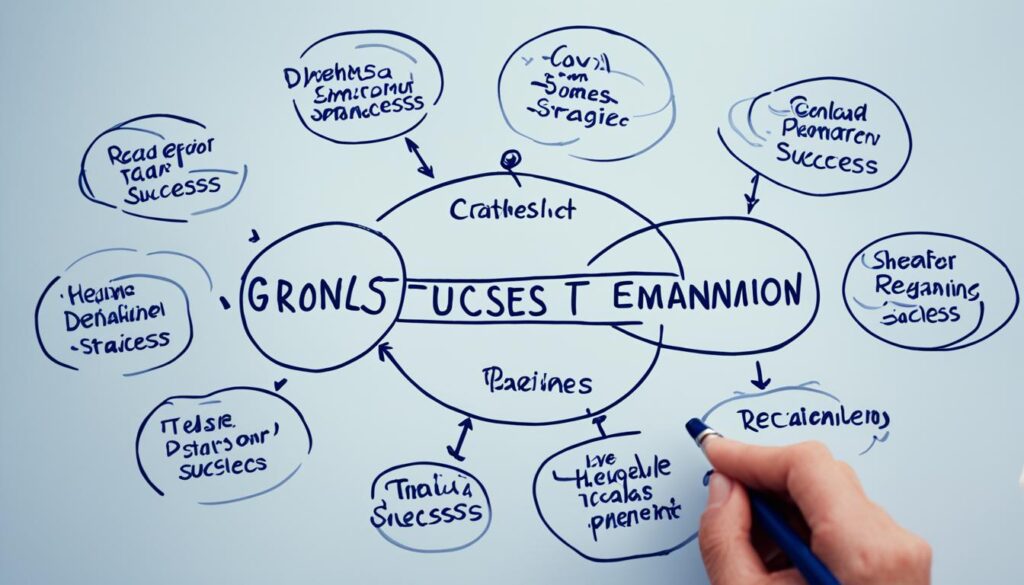A great business plan is essential for the success of any startup or small business. It serves as a roadmap, clarifying the business strategy and identifying potential roadblocks. Writing a winning business plan requires careful consideration of various factors, such as market analysis, financial projections, and organizational structure. In this article, we will provide expert tips and a step-by-step guide on how to create a compelling business plan that can propel your ideas from startup dreams to market success.
Key Takeaways:
- Developing a comprehensive business plan is crucial for the success of your startup or small business.
- A well-crafted business plan helps clarify your business strategy and secure funding from investors.
- Key elements to include in your business plan are an executive summary, market analysis, and financial projections.
- Writing a business plan requires a structured approach, including conducting thorough market research and addressing key elements.
- A winning business plan provides a roadmap for success and serves as a solid foundation for your business venture.
The Importance of a Business Plan
A well-crafted business plan is crucial for the success of your small business or startup. It serves as a roadmap, helping you clarify your business strategy and effectively overcome potential obstacles. By thoroughly planning and documenting your goals and objectives, you can make informed decisions and set your business on the path to success.
One of the key benefits of a business plan is its ability to attract funding from financial institutions and investors. Without a solid, comprehensive business plan, many investor groups may not even consider your venture. By presenting a well-researched plan with realistic financial projections, you demonstrate your commitment and vision, increasing your chances of securing the necessary capital.
A business plan also acts as a roadmap for your business growth. It outlines your marketing strategies, target audience, and competitive analysis, providing you with a blueprint for success. It helps you stay on track and guides your actions, ensuring that you prioritize activities that align with your business goals.
Whether you are starting a new business or seeking additional funding for an existing one, a professionally crafted business plan is essential. It sets the foundation for your success, communicates your vision to stakeholders, and provides a clear roadmap for your business’s future.

| Key Points | Benefits |
|---|---|
| Clarifies business strategy | Helps make informed decisions |
| Secures funding from investors | Increases chances of success |
| Acts as a roadmap for growth | Guides actions and priorities |
Key Elements of a Business Plan
A well-structured business plan includes several key elements that provide a clear and concise overview of your business and its goals.
An Executive Summary
The executive summary is a brief overview of your entire business plan, highlighting the key points and enticing readers to delve deeper into your proposal.
Company Description
In this section, you provide detailed information about your company, including its mission, vision, values, and legal structure. Clearly define your unique selling proposition and explain how your business fulfills a need in the market.
Market Analysis
Conduct thorough market research to analyze industry trends, target market demographics, and assess your competition. Highlight your understanding of market needs and demonstrate how your products or services will meet those needs.
Management and Organization
Detail your management team’s qualifications, responsibilities, and relevant experience. Additionally, outline your business’s ownership structure and any strategic partnerships or collaborations.
Products and Services
Describe your offerings in detail, emphasizing their unique features and benefits. Explain how your products or services solve specific problems or fulfill customer desires.
Customer Segmentation
Identify and segment your target audience based on demographic, psychographic, and behavioral factors. Explain how you will reach and engage with these customer segments.
Marketing Plan
Outline your marketing strategies and tactics to effectively promote your products or services. Include your pricing strategy, distribution channels, and promotional activities.
Logistics and Operations Plan
Provide an overview of your business’s logistics and operations, including location, facilities, equipment, and suppliers. Explain how your operations will support the delivery of your products or services.
Financial Plan
Present your financial projections, including revenue forecasts, expense estimates, and cash flow analysis. Include information on funding requirements, sources of funding, and expected return on investment.

By addressing these key elements in your business plan, you can present a comprehensive and compelling case to potential investors and stakeholders. A well-crafted business plan acts as a roadmap for your success, guiding your actions and helping you navigate challenges along the way.
How to Write a Business Plan
Writing a business plan may seem like a daunting task, but with a structured approach, it can be manageable and even enjoyable. Here is a step-by-step guide on how to write a winning business plan:
Step 1: Research and Market Analysis
Start by conducting thorough research on your target market and industry. Identify your target audience, competitors, and market trends. This analysis will help you understand the market dynamics and position your business effectively.
Step 2: Define Your Vision and Objectives
Clearly define your business vision, mission, and long-term goals. This will give your business plan a sense of purpose and direction. Align your objectives with your market analysis and ensure they are realistic and achievable.
Step 3: Develop a Strong Value Proposition
Clearly articulate your unique selling proposition (USP) and how your product or service solves a problem or meets a need in the market. This will highlight the value you bring to customers and differentiate you from competitors.
Step 4: Outline Your Marketing and Sales Strategy
Develop a comprehensive marketing and sales strategy that outlines how you will reach your target audience, promote your products/services, and convert leads into customers. Include your pricing strategy, distribution channels, and promotion tactics.
Step 5: Create an Organizational Structure
Outline your company’s organizational structure, including key roles and responsibilities. This will demonstrate that you have a solid team in place to execute your business plan effectively.
Step 6: Develop a Financial Plan
Create a detailed financial plan that includes projected revenue, expenses, and cash flow forecasts. This will help you assess the financial feasibility of your business and attract potential investors.
Step 7: Review and Refine
Once you have drafted your business plan, review it thoroughly for clarity, consistency, and accuracy. Seek feedback from trusted advisors or mentors and make necessary revisions. Your business plan should be a living document that evolves as your business grows.
By following these steps, you can write a comprehensive and compelling business plan that lays the foundation for your success. Remember, a well-structured business plan not only helps you articulate your ideas but also attracts investors and guides your business strategy.
| Benefits of a Well-Written Business Plan |
|---|
| Attracts potential investors |
| Serves as a roadmap for your business |
| Helps you make informed decisions |
| Clarifies your business strategy and objectives |
| Presents a compelling case to stakeholders |
| Aids in securing funding |
Conclusion
Writing a winning business plan is an essential step to transform your startup dreams into a reality. By following the expert tips and step-by-step guide provided in this article, you can create a comprehensive and compelling business plan that will impress potential investors and stakeholders. Conducting thorough market research, addressing key elements of a business plan, and presenting realistic financial projections are crucial for success.
A well-crafted business plan will provide you with a roadmap for success and a solid foundation for your business venture. It clarifies your business strategy, identifies potential challenges, and guides your actions. Remember to customize your business plan to align with your unique business goals and objectives. Taking the time to create a winning business plan will not only impress investors but also help you stay focused, make informed decisions, and achieve long-term success.
So, don’t underestimate the power of a well-written business plan. It is not just a document; it is a powerful tool that can propel your ideas and aspirations forward. Start today, invest the necessary time and effort, and watch your ideas take flight!






